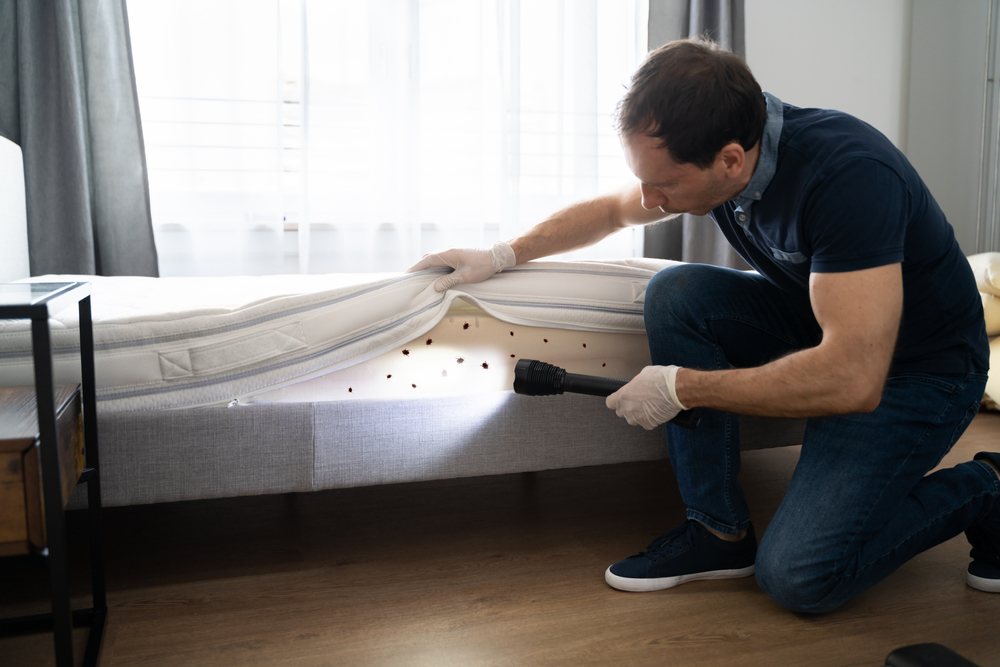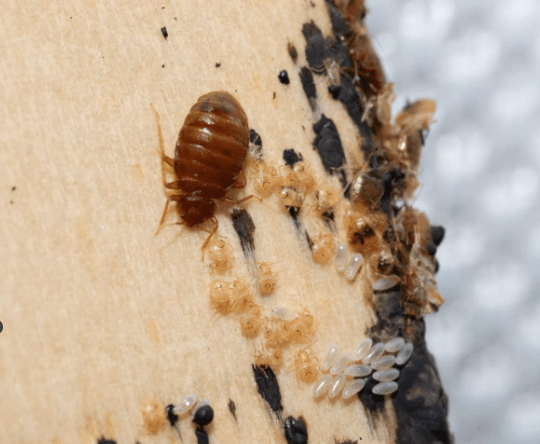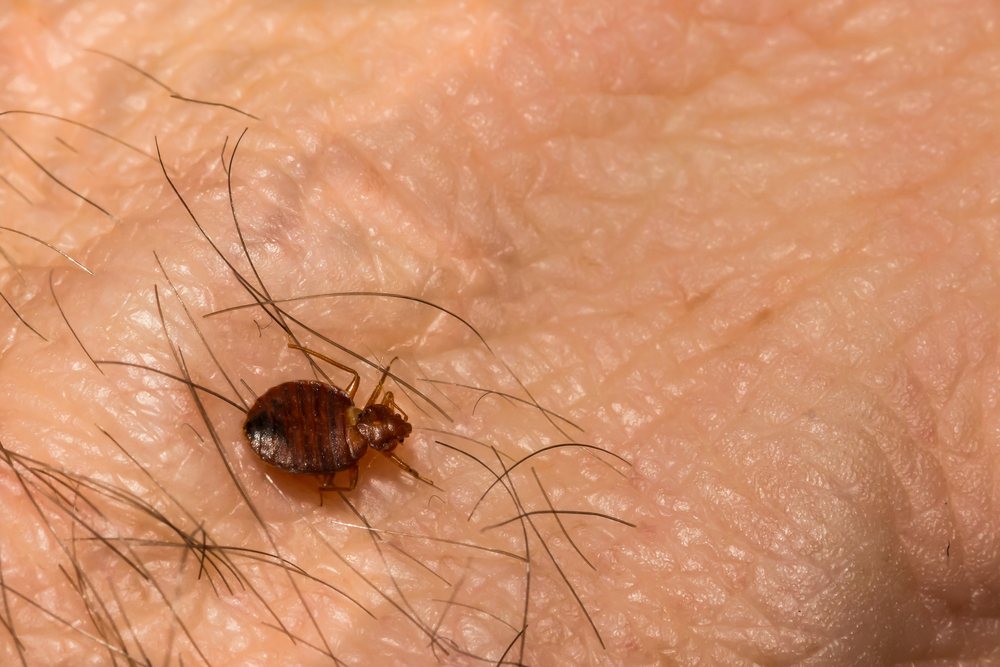Bed bugs are infamous as some of the most irritating indoor pests…
And for good reason.
They’re not restricted by the cleanliness of a room.
Though they certainly take advantage of less than hygienic places.
Bed bugs are especially comfortable in small, dark spaces, which can make locating them an excruciating challenge.
The adage “Where there’s one, there’s a thousand” holds true for bed bugs, as they are explosive breeders.
A female bed bug lays one egg per day, and it only takes 5 to 6 weeks for the larva to fully mature.
Since they’re nocturnal insects, bed bugs will scurry back to their hiding places long before you wake up to discover that your home is infested.
To make matters worse, the symptoms of their presence are just similar enough to those of other pests. This can make it difficult to confirm whether your symptoms are in fact bed bugs.
So, how does one tell the difference between a bed bug bite and a spider bite?
What sets bed bugs apart from mosquitoes, fleas and ticks?
Page Contents:
Common Bed Bug Symptoms
Listed below are the top 5 symptoms that people experience after being bitten by bed bugs.
1. Skin Irritation
Bed bugs will feed off of areas of exposed skin that they come across. Similar to other biting insects like mosquitoes and ticks, bed bugs also inject 2 fluids into the bloodstream as they feed.
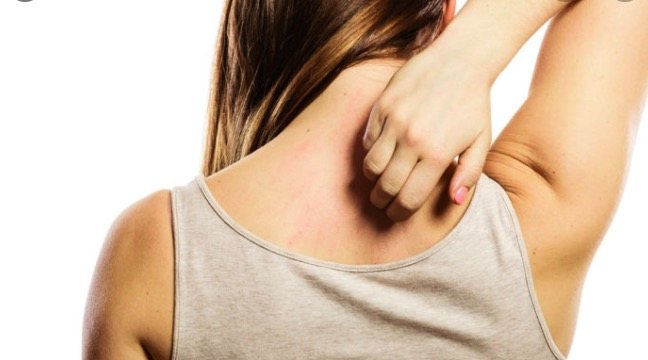
The first is an anticoagulant to prevent the blood from clotting.
The second is an anesthetic that prevents the bite from immediately itching. It is this anesthetic which allows bed bugs to feed without being noticed.
Once this anesthetic wears off, the itching and skin irritation begins. Any attempts to relieve the itchiness by scratching could result in further inflammation and may even lead to infection.
2. Disturbed Sleep
Bed bug bites are a source of irritation at ALL hours of the day, but the stress they create is amplified at night.
During the daytime, it’s easier to ignore bites, as the body is actively producing cortisol, a multi-purpose hormone that contributes to maintaining the immune system and reducing stress.
You’re also consciously applying other remedies to alleviate the itching, or are otherwise preoccupied with something else that would take your mind off the bites.
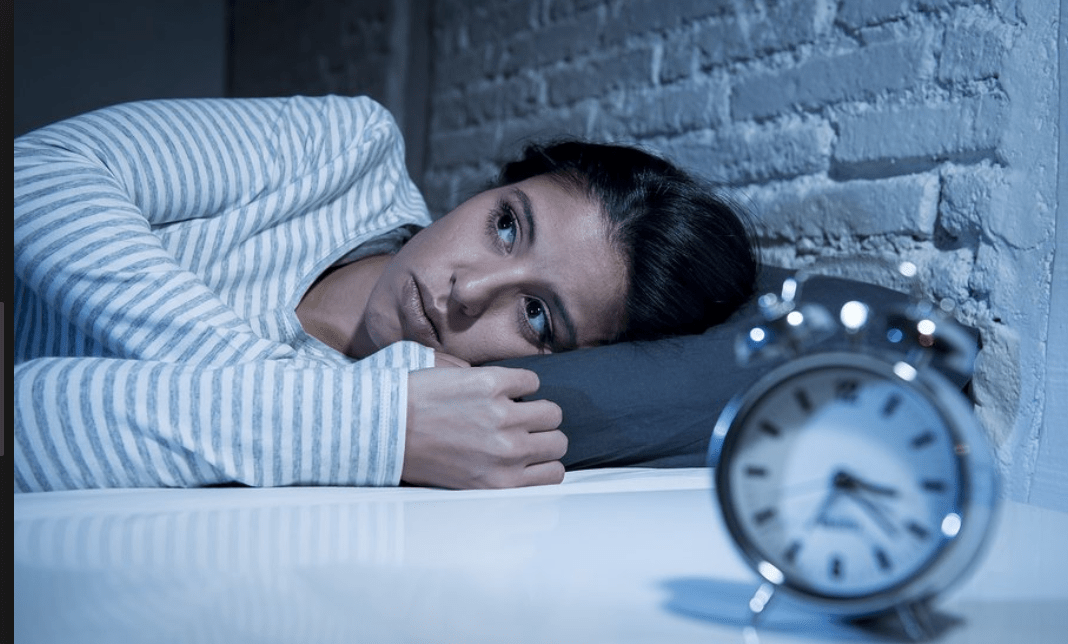
But once night rolls around and bedtime arrives, the body produces less cortisol and other anti-inflammatory hormones, and there isn’t anything left to divert your attention away from the symptoms.
All this is before taking into account that bed bugs are nocturnal creatures, so they’re ready for another feeding every night.
(When you’re sleeping and at your most vulnerable).
The paranoia of the pests drinking your blood might be enough to keep you awake, and many people with bed bugs report suffering from insomnia during an infestation.
And in some cases…
Insomnia and disturbed sleep can occur YEARS beyond the initial infestation.
For more information check out our complete guide on the long-term psychological effects of bed bugs.
3. Marks on your Upper Body
Bed bug bites can be identified as small, red-colored welts that occur anywhere that skin was exposed.
They typically appear in small clusters, which distinguishes them from other bites.
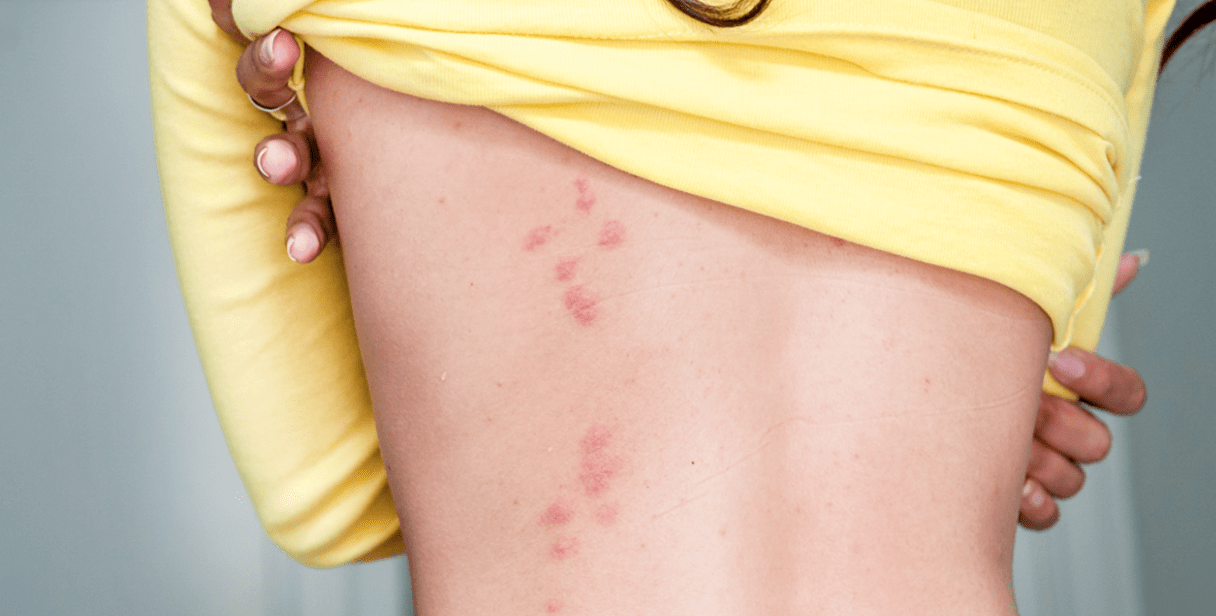
For example…
Mosquito bites only appear as a single raised bump at the site of the bite, and spider bites commonly appear as small puncture marks regardless of the species of spider.
Bed bugs also frequently bite the upper body, which leaves the arms, hands and shoulders most vulnerable; this separates them from flea bites, as fleas tend to feed on the lower extremities.
Befitting their behavior, bed bug bites can also be found on hard to cover areas that can leave you embarrassed.
4. Anxiety
Nobody wants to live with the thought that their home is a nesting area for any sort of pest, let alone bed bugs. Even if your house is the pinnacle of cleanliness, and even if you do instantly kill a few bugs here and there…
You can still face reoccurrence of the infestation.

This can cause many forms of anxiety, along with paranoia, constant frustration, and depression.
Bed bugs are impressive at staying unseen. Although they’re big enough to be seen with the naked eye, bed bugs can establish their nests in nooks and crannies you have trouble cleaning or might otherwise be unaware of.
Again, since they are nocturnal feeders, the mere idea of being a source of food while you sleep is enough to turn anyone into an insomniac.
At times, it can seem almost impossible to fully eradicate the source of the infestation without professional help.
5. Social Isolation
Getting infested by bed bugs is by no means the victim’s fault.
Bed bugs have nothing to do with your cleanliness or your hygiene.
Yet the social stigma that comes from bed bugs can cause victims to withdraw from their family and friends to avoid embarrassment.

It’s natural for victims to feel like people will see them differently or to be embarrassed by some ugly-looking bites.
If you’re a victim of bed bugs and are feeling depressed or socially isolated you should know that there is NOTHING to be ashamed of.
Bed bug infestations can happen to anyone, anywhere, at any time.
How Long Does It Take for Bed Bug Symptoms to Appear?
The time it takes for symptoms to appear varies from person to person. People who are more sensitive to bug bites might develop symptoms within a few hours, while others might not develop physical reactions for several weeks.
On average, symptoms will appear anywhere between 1 to 3 days after first being bitten by a bed bug. With proper treatment, they will clear after 2 to 3 weeks.
Once bites do appear there are a few home remedies that can help them heal faster.
These include the following:
Cooling Lotions:
Over the counter medications such as Benadryl, or Cortisone can help immediately relieve the symptoms of bed bug bites. These topical ointments should provide relief for a few hours to help you fall asleep or get through critical parts of your day.

This form of medication can be used multiple times per day as needed.
Oral Antihistamines:
These are pills that can dull the itchiness and irritating sensation of bed bug bites. These should be used sparingly and should only be taken if topical lotions or cooling ointments are not providing enough relief.
This form of medication can be used once or twice per day (refer to the medication label for specifics).
Antibiotics:
This form of medication should be used only in the case of infection. If scratching occurred and the bites turned into open wounds, there is a good chance of infection.
Antibiotics can help prevent or heal you from an existing infection that originated from a bed bug bite.
Can You Confuse Bed Bug Symptoms with Poison Ivy?
There are several important differences between a bed bug bite and a rash caused by poison ivy.
Bed bug bites take the appearance of small, raised welts which are often clustered together in random patches. The bite will only spread if an afflicted individual repeatedly scratches the surface of the skin in an attempt to reduce the itchiness associated with the bite.
(Opening up new areas of the body for infection).
In contrast, a skin rash caused by poison ivy is flat and does not consist of any raised skin.

The rash is caused by an oily resin which the plant produces, which can result in the rash “spreading” if previously unexposed areas come into contact with this resin.
More Severe Bed Bug Symptoms
In rare cases, people who have a bed bug infestation can display more severe symptoms if they are bitten. Those who are allergic to bed bug bites will demonstrate physical indicators akin to the flu—fever, nausea and difficulty breathing.
Other symptoms include breaking out in hives, a swollen tongue, and even fainting. If you suffer from an infestation and exhibit any of these symptoms, please seek medical treatment immediately.
If Not Bed Bug Bites Than What?
People often jump to conclusions when they experience any sort of negative reaction on their skin.
The important thing is…. Not all bites are from bed bugs.
In fact skin irritation or bumps are most often misdiagnosed as bed bugs. Instead, these symptoms can come from any of the following:
Chiggers:
Chigger bites will rarely live indoors and they’re much more likely to be found in dense woods or brush. To decipher Chigger bites over bed bug bites you should look at the location of the bite on your skin. Chigger bites will almost always occur around the waist.
Scabies:
This is an itching condition that is highly contagious and can spread quickly from close contact. While both bed bugs and scabies can leave serious itching behind, scabies do not leave bumps or welts.
Ticks:
Just like Chiggers, ticks are less likely to be found indoors. These creatures are special in that they will attack you along with your four-legged pets. The biggest difference between ticks and bed bugs is that ticks will remain attached after they bite you.
Roaches:
Most people don’t even know that roaches bite, but they will if they’re desperate for food. Roaches are not parasites like bed bugs, and are not looking for blood, but rather food residue left in areas around your body. That Is why roaches will typically bite around your hands or fingers.
You May Be Eligible for Financial Compensation
If you or a loved one suffered from a bed bug infestation in a hotel, apartment, or another location…
You may be eligible for a payout.
Get connected with a licensed personal injury attorney in your area to discuss your case and help determine whether you can file a lawsuit.
Contact us for your free consultation here. You can also give us a call at (855) 733-9217.
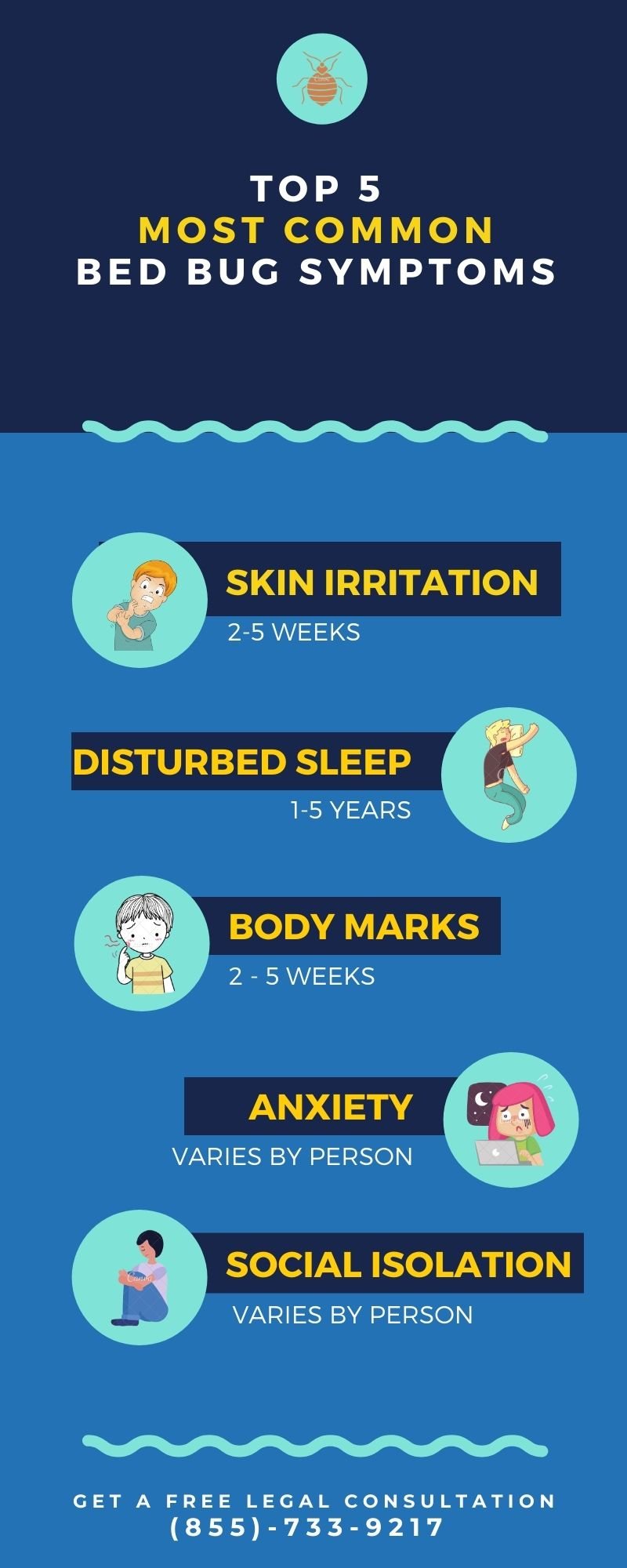
Get in touch today!
